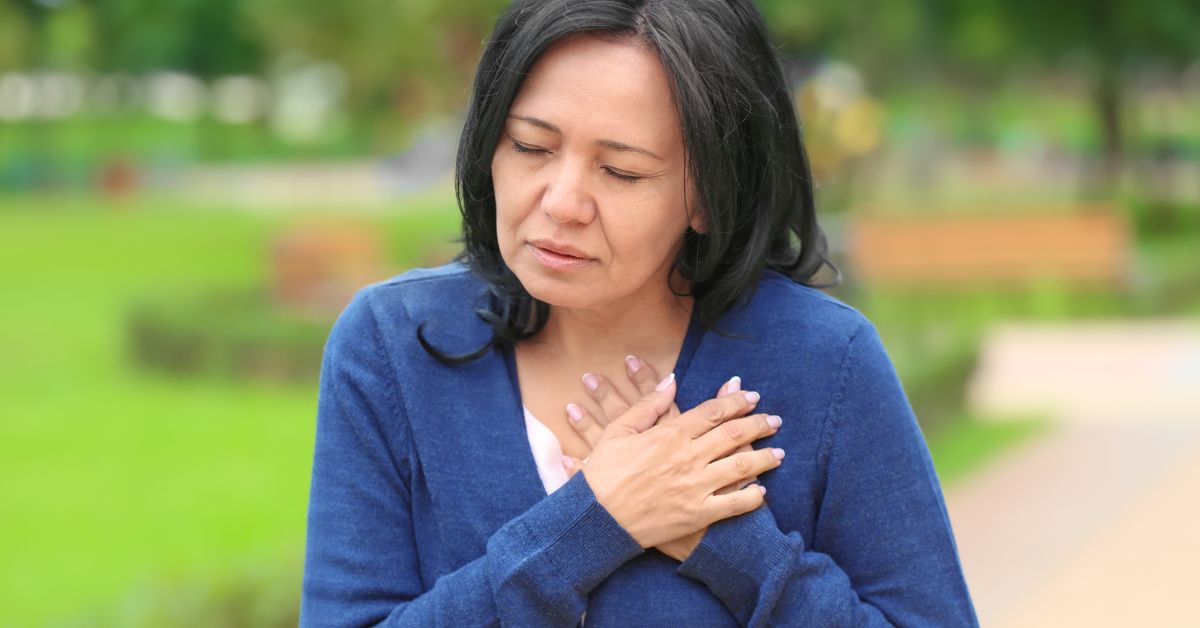When it comes to recognizing the signs of a heart attack, time is a really important factor. Heart attacks often occur suddenly and can be life-threatening events. That’s why recognizing early warning signs before a heart attack can make a critical difference in saving your life.
It’s the early recognition of heart attack symptoms that can play a critical role in preventing severe damage to the heart muscle and improve the chances of recovery. Understanding what to look for can help you identify when it’s time to call 911.
Understanding heart disease and risk factors
It may be common knowledge at this point, but it’s worth restating: Heart disease is the leading cause of death in the United States.
There are several risk factors that can increase the likelihood of having a heart attack:
- High blood pressure: Making your heart work harder 24 hours a day, seven days a week, is never good and can cause a lot of issues with its ability to function properly.
- High cholesterol: High levels of cholesterol cause plaque to build up in and around your arteries, which blocks blood flow to your heart.
- Diabetes: People with diabetes are twice as likely to develop heart disease as people without diabetes.
- Smoking: Smoking causes a lot of issues in your body, but regarding heart health, smoking leads to damaged blood vessels.
- Obesity: Excess weight and lack of exercise is a leading cause of heart disease.
- Sedentary lifestyle: A lifestyle that doesn’t include much activity can lead to weight gain and strain on your heart, leading to heart disease.
- A family history of heart disease: If you have a first-degree relative who has had a heart attack, you’re likely at a higher risk of having one yourself.
- Blood clotting issues and narrowed blood vessels can also prevent proper blood flow to the heart, increasing the risk of a heart attack.
Understanding that heart attacks occur when a portion of the heart muscle suddenly loses its blood supply is important. A blood clot or the narrowing of the coronary arteries could limit blood flow to the heart muscle. When this blockage occurs, the tissue in the heart begins to die and this can cause permanent damage.
Symptoms and warning signs before a heart attack
Recognizing the early heart attack warning signs is key to saving lives. The symptoms can appear gradually or suddenly and can vary widely from person to person. Both men and women experience heart attacks, but women often report different symptoms than men, making it harder to diagnose in some cases.
Chest discomfort is the most well-known and common symptom of a heart attack. People usually describe the discomfort as uncomfortable pressure, squeezing, fullness or pain, and they often feel it on the left side of the chest. It’s important to understand that chest pain may radiate to other parts of the body, including the jaw, neck, shoulders, arms or even the back. The pain may come and go or intensify over time.
For some, the chest discomfort is not as severe and may be mistaken for indigestion, an anxiety attack or heartburn. If pain or discomfort lasts longer than a few minutes or recurs, you should treat it as a potential heart attack. If you are unsure whether it’s a heart attack, it’s always better to call 911 for emergency medical assistance.
Uncommon symptoms in women
Women may experience heart attacks differently than men. While men typically experience severe chest pain, heart attack symptoms in women may be more subtle and less obvious.
Shortness of breath is one of the common warning signs before a heart attack for women. Unusual fatigue, nausea, lightheadedness or even anxiety can also accompany it. In fact, many women report feeling uncomfortable pressure or pain in the chest that is more diffuse, radiating to the neck, jaw, back and arms.
People often overlook or dismiss women experiencing symptoms of a heart attack. For instance, many women report feelings of indigestion, stomach discomfort or abdominal pain. These signs can be mistaken for something less serious, leading to delays in seeking medical attention.
As a result, women may be at greater risk of having a delayed diagnosis and treatment for a heart attack.
Recognizing early warning signs before a heart attack occurs
There are several early warning signs of a heart attack that should not be ignored:
- Chest discomfort: This is the classic sign of a heart attack. Chest pain may feel like pressure, squeezing, or fullness in the center of the chest. It can last for a few minutes or go away and return later.
- Pain in other parts of the body: Pain or discomfort may radiate to the neck, jaw, back, shoulders, arms or even the stomach. These areas often suffer when the heart muscle doesn’t receive enough blood and oxygen.
- Shortness of breath: Difficulty breathing or feeling winded without exertion can be an early sign that the heart is struggling. Shortness of breath may occur alongside chest pain or may be the only symptom.
- Lightheadedness or dizziness: When heart issues reduce blood flow to the brain, a feeling of faintness or loss of balance can occur. You should not take this symptom lightly.
- Cold sweat: Breaking out into a cold sweat, especially if you feel anxious or out of breath, is a common sign before a heart attack occurs.
- Nausea or vomiting: Some people may experience nausea or vomiting along with chest discomfort. This is especially common in women and may be mistaken for other conditions.
When to call 911
Noticing early signs before a heart attack occurs is important, but sometimes it’s not possible. If you or someone around you experiences any of the heart attack symptoms mentioned, it’s crucial to act quickly. Call 911 and go to the nearest emergency department. Early treatment can help minimize damage to the heart muscle and increase the chances of a full recovery.
Learn about the heart and vascular care we offer at Mercy Health.






